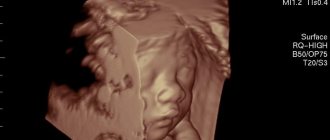Baby
The 17th week of pregnancy is marked for the baby by an active increase in the mass of his muscles, their gradual strengthening, which allows him to move in the tummy more intensely and variedly. Quite frequent movements of the limbs help the child train muscles and also develop the joints of the knees and elbows. At this stage, the hands are still clenched into fists, rarely unclenched, and only for the purpose of grasping the umbilical cord or sucking a finger. Until 17 weeks, the fetal head was practically motionless, dropped quite low, and the chin was tightly attached to the chest. Strengthening the muscles of the back and cervical region at this stage allows the child to raise his head to an almost vertical position.
Internal organs continue to develop and improve. Their structure only becomes more complex, which contributes to the expansion of functionality. Their preparation will allow you to begin normal, full functioning after the baby is born.
It is important to note the changes that occur in the vascular system and heart of the fetus. The nerve plexuses that surround the heart give rise to the formation of the conduction system; Its uniqueness lies in the fact that the heart does not need signals from the outside to work. All human internal organs obey the central nervous system. The brain sends certain instructions according to which each of the organs works. The heart, in turn, functions with the help of command signals that arise within itself and cause it to contract. The exclusively autonomous mode of operation of the heart allows it to be independent of the level of central nervous system activity throughout a person’s life.
The 17th week of pregnancy is also characterized by the formation of the respiratory system, namely, the strengthening of the lung muscles. Active respiratory contractions resemble inhalation and exhalation and thereby strengthen the muscles of the chest. The formation of the alveolar apparatus of the lungs also occurs. Alveoli are presented in the human body in the form of small bubbles, which are located on the surface of the respiratory apparatus and are responsible for gas exchange. Each breath helps saturate the blood with oxygen. At the 17th week, the alveoli are in a compressed state, but immediately after birth, with the first breath, they will straighten out and be ready for normal functioning.
The weight of the fetus at this stage is about 150 g, and the body length is 12-13 cm.
Intimate relationships
A woman’s sexuality does not disappear during pregnancy; on the contrary, hormonal changes lead to increased desire. Sexual intercourse gives an emotional surge and provokes the production of endorphin, called the “hormone of joy.” Intimate relationships stimulate blood circulation in the reproductive organs and help strengthen mutual understanding between spouses.
During this period of pregnancy, the following contraindications to sex may occur:
- Placenta previa;
- Risk of miscarriage;
- Infections, inflammatory diseases of the genital organs of both spouses.
The appearance of pain and bleeding is a reason to stop sexual intercourse and consult a doctor.
Future mom
The abdomen is actively growing, and the fundus of the uterus occupies a position midway between the navel and the woman’s pubis. The normal weight gain for a given week is 5 kg. Also, the 17th week of pregnancy is characterized by an increase in the total blood volume of the expectant mother, because her fetus needs intensive nutrition. You may also notice a rapid heartbeat due to large amounts of blood passing through the heart. Additional heart contractions or tachycardia may not be felt at all by the pregnant woman or may cause her discomfort. In case of active manifestation of tachycardia, you should seek help and advice from your gynecologist or cardiologist, who can identify the symptoms of heart disease in a pregnant woman, as well as prescribe the correct treatment to maintain normal well-being.
A sharp increase in the volume of blood in the usual circulation can cause the expectant mother to have an increased level of bleeding gums, as well as nosebleeds. Increased load on the capillaries often leads to a malfunction in their operation. The mucous membranes of the nose and mouth are especially vulnerable. Properly selected vitamin complexes will correct this situation and strengthen the walls of blood vessels. In addition, doctors recommend using a soft toothbrush for hygienic purposes, which will reduce the risk of bleeding gums. It is also recommended to rinse the nasal passages with solutions such as AQUAMARIS, PHYSIOMER, SALIN. You can prepare a similar solution at home if you wish. For this you will need 1 teaspoon of salt and a glass of water. All ingredients should be mixed before use. If these simple recommendations are ineffective and bleeding becomes more frequent, you should seek help from a specialist.
Good to know
How to give birth to a child with extraordinary abilities?
Why go to the dentist during pregnancy?
Relationship crisis during pregnancy
Surgeries during pregnancy: what to do with anesthesia?
And a good mood... How to maintain positive emotions for pregnant women
How does the body change during pregnancy? 5 tips for expectant mothers
All texts for pages about mother and baby were kindly provided by RAMA Publishing - these are chapters from the book by Svetlana Klaas “Your Favorite Little Man from Conception to Birth”, reviewer Irina Nikolaevna Kononova, Candidate of Medical Sciences, Associate Professor of the Department of Obstetrics and Gynecology of the Ural State Medical Academy (Ekaterinburg).
Baby
At the 18th week, the child weighs about 200-250 g, and its length is approximately 20 cm. During this period, the structure of the brain becomes more complex, and its total mass also increases; nerve fibers are covered with myelin, a special fatty sheath that promotes accelerated nerve conduction. nerve impulses. After the birth of the child, this shell will allow the child to respond to stimuli from the outside.
The appearance of the fetus already slightly resembles a newborn baby and is actively approaching this state. Facial features become more and more distinct, the ears, which were previously tightly pressed to the head, are straightened, the middle ear is formed, and its perception is also improved. At this stage of pregnancy, the baby can already perceive stimuli from the outside and respond to various kinds of sounds. The noises that occur in the mother’s body due to the active work of the internal organs are completely normal and familiar to him, and also contribute to the training of auditory perception.
It is impossible not to note the intensive work of the fetal endocrine system. At 18-19 weeks, the release of “baby” hormones is large enough that even the mother’s body can be supplied with them. If a woman’s body lacks its own hormones, they are compensated for by children’s hormones, and the mother’s condition returns to normal.
First fetal movements
At week 17 you can already feel faint fetal movements. They are still so tender that, without experience of pregnancy, it is difficult to distinguish them from the sensations caused by food or gases moving through the intestines. If a woman does not notice fetal movements by this time, it is advisable to contact her gynecologist so that he can listen to the baby’s heartbeat and perform an ultrasound. The onset of movements at 22 weeks during a pregnancy proceeding without pathologies is also a variant of the norm, so you should not be upset in advance.
Future mom
This week, some mothers feel the first movements of their baby. Most often, women for whom this is the first child can feel fetal movements at 19-20 weeks. At earlier stages, namely, at 16-18 weeks, those women who already have their own children, and who are also quite thin with a slight layer of fat under the skin, notice movement.
At the first stages, the movements will be rather weak, brief and episodic, but after a short period of time they will become more distinct and more frequent. The nature of the shocks can be different:
- touching;
- light tremors;
- twitching;
- rolling.
For a woman, the first kicks of her baby are very expected. This is an exciting moment that will allow the expectant mother to remember these pleasant sensations with trepidation, and also as proof of her connection with the child. At the 18th week, the baby’s movements are quite chaotic, varied and appear while the baby is awake. With emotional stress, they can become more intense. Also, the child may report an insufficient amount of oxygen, which occurs due to the woman’s lack of movement, insufficient time spent outdoors, as well as being in the same position for a long time (driving a vehicle, at work). Most of the time at this stage of development the fetus sleeps.
A special problem is frozen pregnancy
Cessation of fetal development can occur for various reasons. Among them are hormonal imbalance, Rh conflict between mother and child, and the consequences of infection. The body may not immediately begin to reject the fertilized egg; first, the pregnancy fades. This condition is sometimes not accompanied by any symptoms, but during the next examination, the obstetrician-gynecologist will definitely diagnose the problem.
Symptoms:
- Lack of fetal movements;
- Temperature increase;
- Bloody or bloody discharge;
- No signs of pregnancy (toxicosis, breast swelling);
- Pain in the lower abdomen and lower back.
A frozen pregnancy is terminated in a hospital setting, the woman is prescribed a course of anti-inflammatory drugs and procedures, and is offered psychological assistance.
Baby
The 19th week is characterized for the fetus by intensive growth of the limbs in length, an increase in size, and a slowdown in head growth. Its length is already 25 cm, and its weight is approximately 250-300 g. The child changes greatly in appearance, his body no longer looks disproportionate.
The fat under the skin allows the relief of the body to change slightly and become rounded. This brown fat is formed at 19-20 weeks. After birth, it is he who will perform the function of thermoregulation and protect the child from hypothermia or overheating. With age, this fat disappears and remains only in certain places: in the thickness of a person’s cheeks, kidney area, under the armpits, and shoulder blades.
At this stage, the formation of permanent teeth, which are located in the dental plate under the rudiments of milk teeth, and the maturation of the brain also occur. Special processes allow connections between neurons to be established. Cells intertwine with each other and create a whole system for transmitting impulses, ensuring the synchrony of the brain. The structures responsible for touch, taste, vision, hearing, and smell are actively developing.
Changes also occur in the hematopoietic system. The spleen is connected to the process of formation of blood cells, produces leukocytes, the task of which is to protect the child’s body from external and internal factors. Until 19-20 weeks, the fetal blood consisted only of red blood cells, and at this stage its composition changes sharply and approaches the composition of the blood of a newborn.
Future mom
The expectant mother's belly is actively growing, and the fundus of the uterus is already located up to 2 cm below the navel. The weight gain is about 3-6 kg and is distributed proportionally between the placenta, uterus, fetus, and amniotic fluid. The weight of the fetus is only a tenth of the total added weight.
Due to the intensive growth of the uterus, a woman may feel discomfort. Often this condition manifests itself when changing body position, bending to the sides, or walking. The nature of pain may vary. These can be nagging, sharp, sudden pains that occur on one or both sides. Stretching of the ligaments that are attached to the side walls of the uterus and pelvic bones in order to fix the uterus occurs quite actively. A woman’s uterus is, as it were, in a suspended state thanks to this ligamentous apparatus. When the ligaments are stretched during changes in the position of the uterus, pain occurs.
This type of pain is completely normal and characteristic of this period of pregnancy. In critical situations, a gynecologist may recommend that a woman take antispasmodics, which will help relax the uterus, as well as eliminate the problem of pain almost completely. At the 19th week, it is important for the gynecologist to exclude such risks of pregnancy complications as the threat of miscarriage and uterine hypertonicity. If one of these risks is detected, the expectant mother will be prescribed hospital treatment.
17th week of pregnancy: what to look for
- Perhaps you can't wait to find out if you're expecting a boy or a girl. It may still be too early for a guaranteed “forecast.” But at an ultrasound between 18 and 20 weeks, your doctor will be able to try to determine the sex of your baby if that's what you want. How accurately the doctor can determine the gender will depend on the position of the baby during the ultrasound. In the meantime, you can find out who you'll have with our fun quiz.
- Have you already thought about courses to prepare for childbirth? We're approaching mid-pregnancy, and if you're planning on taking such courses, now is the time to start looking. The sooner you start your search, the more options you will have with available dates, times, etc. If you don’t know of any organizers of such courses, consult with parents you know and/or your doctor.
- You may want to start thinking about which pediatrician you will see with your baby. Perhaps the parents you know, as well as the doctor monitoring your pregnancy, will be able to share recommendations with you.
- You may find our article on how to choose a pediatrician useful.
- During pregnancy, you may experience tension in your family relationships. This is quite natural, given the financial and domestic worries that accompany such a big life change. Discuss your experiences with each other - this can help relieve tension and avoid conflicts. Make the necessary preparations together, attend birth preparation classes and ultrasounds together if this is comfortable for both of you. If you feel like you need help, ask your doctor or moms you know - they may be able to recommend a suitable therapist or support group.
Baby
The body length of the baby at this stage is 28 cm, and the weight is about 340 g. Before this week of pregnancy, the length of the fetus was measured by calculating its length from the crown to the tailbone. After the 20th week, the specialist includes in the concept of growth the length of not only the body, but also the lower limbs.
At this stage of development, the child is quite active, makes numerous movements, since there is enough space in the uterus for him to somersault, push off from the walls, as well as other movements. The baby may smile, grasp the umbilical cord, touch himself, frown, and close his eyes. His facial expressions are quite developed and more pronounced than before.
The skin becomes dense, actively covered with vellus hairs and special lubricant. A large amount of this lubricant is found in the folds. This lubricant prevents the risk of mechanical friction, has bactericidal properties, and ensures optimal passage of the fetus through the mother's birth canal during childbirth.
It is impossible not to note the intensive development of the gastrointestinal tract. Small portions of amniotic fluid, which the child swallows, wash the walls of the intestines and stomach, lead to peristalsis training, and promote intestinal contraction.
At the 20th week, amniotic fluid is processed. The first stool formed in the child’s body is meconium. It has a dark green color. It consists of mucus, water, epithelial cells, and bile. Meconium accumulates in the intestinal lumen. On the first day of birth, it comes out.
Vaginal discharge
Light translucent discharge of a small volume, with a slight sourish odor, is the norm at 17 weeks of pregnancy. The addition of pus, mucus, flakes, curdled clots, a change in color from white to yellow or green are signs of vaginal infection or candidiasis. During pregnancy, local immunity suffers, so inflammatory pathologies appear more often than usual. Any change in the nature of vaginal discharge is a reason to visit a doctor and get a smear for urogenital infections.
Candidiasis (thrush) often accompanies pregnancy, manifested by burning and itching in the vagina, hyperemia of the mucous membrane of the external genitalia and cheesy discharge. Normally, the fungus of the genus Candida is always present in the female intimate microflora in small quantities. The onset of pregnancy is the reason for its rapid growth. For candidiasis, both sexual partners must be treated, otherwise relapses of the disease are inevitable.
Future mom
The 20th week marks the end of the first half of a woman's pregnancy. Starting from the next weeks, the load on the body of the expectant mother only increases. This fact can be explained by the active development of the fetus in the womb.
The pregnant woman's abdomen increases significantly, and the fundus of the uterus is already at the level of the navel. During this period, a woman may complain of symptoms of shortness of breath: after all, the uterus is already beginning to put pressure on the lungs. Also characteristic of this week is increased urination. Squeezing the bladder leads to frequent urge.
Discharge from a woman’s vagina also increases. Large blood flow contributes to increased secretion production. The discharge may be mucous or white. It should also be noted that they should not have an unpleasant odor or cause itching or burning. Changes in a woman’s discharge are a reason to consult a doctor, because this can signal the expectant mother about the presence of various types of diseases. Curdled, thick, yellow discharge with an unpleasant odor can signal the presence of sexually transmitted infections and their exacerbation, microflora disturbances, and the manifestation of thrush. Pregnant women are prone to colpitis, since their mucous membrane becomes more attractive to microbes, promotes their active reproduction and thereby increases the risk of contracting an infection to the fetus.
That is why, at the 20th week, women are required to undergo screenings, a smear of secretions for flora, and also undergo a diagnosis of sexually transmitted infections. If any signs of deterioration in the pregnant woman’s condition are detected, the doctor may prescribe further examination and a course of treatment.
Analyzes and examinations
When visiting a antenatal clinic, the obstetrician-gynecologist will measure the pregnant woman’s blood pressure, weight, uterine height, offer a urine test and undergo a “triple test” of the second screening, if the expectant mother has not already undergone it.
Blood parameters studied and their norm:
- Chorionic gonadotropin (hCG) – from 6140 to 103000 honey/ml;
- Alpha fetoprotein – from 30 to 90 honey/ml;
- Free (unconjugated) estriol – from 9.9 to 18.9 nmol/l.
Deviation from the norm indicates possible chromosomal pathologies of the fetus and genetically determined diseases.









